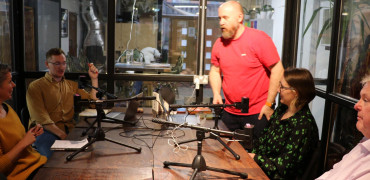Bristol, a bustling city in the heart of Southwest England, known for its rich history, vibrant music scene, and street art culture, has a new claim to fame - The Wave!
Yes, you heard it right. A city known for its lack of coastline has now become a hot spot for surfers seeking the thrill of riding the waves, thanks to an innovative and sustainable urban surfing destination - The Wave.
If you like the idea of surfing in a man-made lake, with controllable waves, then this place should definitely be on your radar.
However, as I discovered when I spoke to the Founder and Chief Visionary Officer, Nick Hounsfield, this place is not just about the thrill of surfing. It's also a pioneer in sustainability, wellbeing and community engagement.
The entire facility is powered by renewable energy, minimising its carbon footprint and showcasing Bristol's commitment to environmental consciousness.
The Wave also collaborates with local schools, charities, and community groups, making surfing accessible to all, regardless of age, background, or ability.
It's also leading the way to improving wellbeing through Blue Health (more on that later) and is a shining example of how innovation can be harnessed for the greater good, creating a positive impact on both people and the planet.
One thing they were clear on was the need for it NOT to involve fossil fuels in any way
On a mission
As you can hear in the full podcast, Nick Hounsfield is on a mission and part of that is to get people reconnecting with themselves, with each other and with nature.
After working for his family, Nick became a British surfer, then Chair of Surfing England and he is now defined by Google as an ‘entrepreneur’.
After spending the best part of 18 years as an osteopath helping people with neck and back problems, he realised that his patients were often unconnected with themselves and with nature and so began the germ of an idea that has blossomed into The Wave.
How could he help people get more exercise, focus on the quality of their diets and increase their connections with both other people and with nature?
And how could this be achieved in a sustainable way?
A triple-bottom-line approach
As a surfing fan, Nick’s ‘light bulb’ moment came when he heard about a new technology that could create perfect waves in an inland lake.
He describes it as a Eureka moment as he already had the vision of what a space could feel like and creating man made waves would act as the super cool hook on which to hang his vision.
Nick started out with £500 so needed financing for what eventually cost £30m to build. He spoke to Tim Smith at the Eden project who told Nick that The Wave was a ridiculous idea, but that he should definitely do it.
Working with Chris Heinz who co-founded Surfers against sewage and became Nick’s mentor, they developed their first sustainability policy right at the start, so they could work out who was serious about helping them and was talking to them for all the right reason.
One thing they were clear on from day one was the need for it all to be sustainable and NOT involve fossil fuels in any way.
This evolved into what he and his partners call the ‘triple-bottom-line' approach, which is now embedded in the DNA of the company and everyone who is involved in it.
This seeks to balance the financial bottom line (balancing the books and paying everyone), with the social bottom line (being good to people and helping them), and the ethical or sustainable bottom line (looking after the planet).
Blue Health
The Wave is located right in the middle of pristine countryside outside Bristol, and anyone visiting is immediately engulfed by nature.
As I found in the walk down to The Wave from the car park, my shoulders eased with every step and my breathing became more relaxed and my mood climbed. Even the sun appeared brighter the nearer I got to the centre.
And when I arrived at The Wave, one of the first thing I noticed was that everyone was smiling, especially the people working there.
And I have to agree with Nick and put this down to what is called Blue Health, which is the concept that being near or in water, listening to it and listening to the waves, is fundamentally good for humans.
It can not only help your body, but also your mental health and wellbeing and just by being in water, you take pressure off your limbs, and it can help your body relax and recover.
Overall, any connection with water is therefore good for both physical and mental health.
Being near Bristol
As I stood on the shores of The Wave, watching surfers of all ages and skill levels revel in the joy of riding the waves, I was struck by the beauty of the convergence of science, technology, and human passion.
It's a testament to Bristol's pioneering spirit and its unwavering commitment to pushing the boundaries of what's possible. The Wave is not just a surfing destination; it's a celebration of human ingenuity, a triumph of science, and sustainability.
In the podcast, we talk more about the history of The Wave and the barriers Nick had to overcome. We touch on the sustainable drive of places like Bristol and Nick explains why he chose the location he did. He also talks about his vision of bringing Blue Health to more people and to different parts of society, especially those disadvantaged or deprived of the opportunity to commune with nature and Blue Health.
I could write loads of pages detailing all that along with much, much more about Nick Hounslow, The Wave, Blue Health and the sustainable community in and around Bristol.
But it’s all in the podcast, so if you’ve got half an hour, do check it out for yourself on Spotify, or on Apple.
And if you want to check out The Wave, then visit their website and book a session soon.
Dan Smith is Sustainability and Construction Manager




